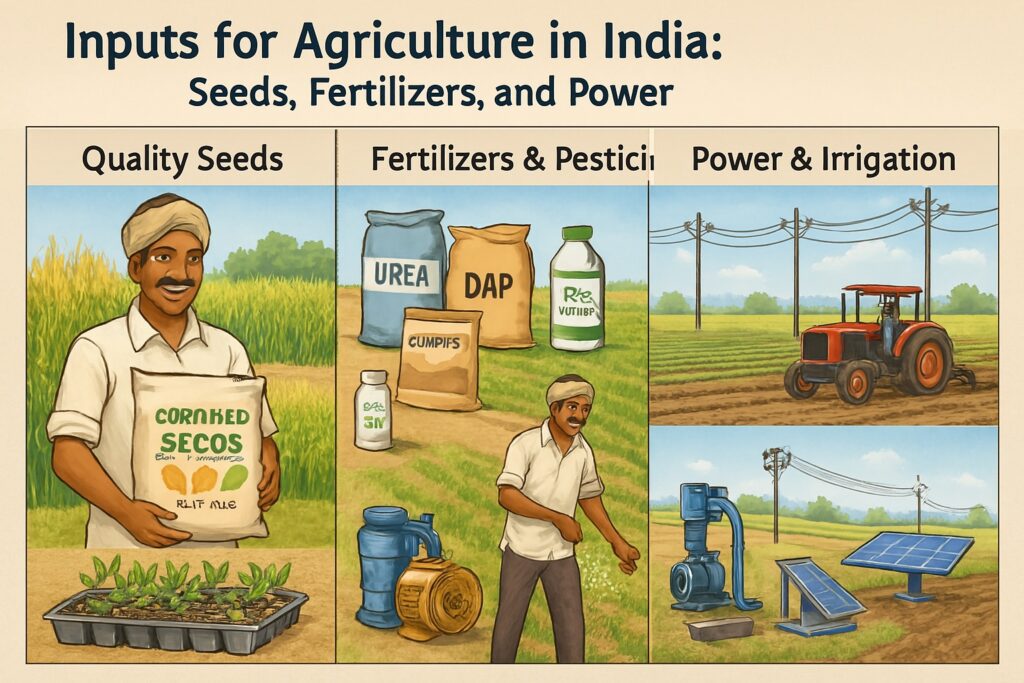Agriculture is one of the most important sectors of the Indian economy, contributing significantly to the country’s GDP and providing employment to millions of people. The success of Indian agriculture is dependent on several key components, including seeds, fertilizers, and power. These elements contribute significantly to improving crop yields and achieving food security for the growing population.

Table of Contents
Seeds: The Foundation of Agriculture
Importance of Quality Seeds
Seeds are the most crucial input in agriculture. Good quality seeds can increase crop productivity by 15–20% even under other suboptimal conditions. The Indian seed industry is one of the largest in the world and has witnessed major developments post the Green Revolution.
Types of Seeds in India
-
Breeder Seeds: Developed by research institutions.
-
Foundation Seeds: Produced from breeder seeds and used to create certified seeds.
-
Certified Seeds: Sold to farmers; they meet quality standards.
Government Initiatives
-
National Seed Policy (2002): Promotes private sector participation and quality assurance.
-
Seed Village Programme: Encourages local seed production.
-
Krishi Vigyan Kendras (KVKs): Disseminate knowledge and distribute quality seeds.
Fertilizers: Enhancing Soil Fertility
Types of Fertilizers
-
Chemical Fertilizers: Urea, DAP (Di-ammonium Phosphate), MOP (Muriate of Potash).
-
Organic Fertilizers: Compost, green manure, and biofertilizers.
Usage and Trends
India is the second-largest consumer of fertilizers in the world. The use of nitrogenous fertilizers (like urea) is the highest, leading to nutrient imbalance in some regions.
Government Schemes
-
Fertilizer Subsidy Program: Makes fertilizers affordable for farmers.
-
Soil Health Card Scheme: Promotes balanced fertilizer use based on soil testing.
-
Neem-Coated Urea: Prevents black marketing and improves efficiency.
Power: A Key Agricultural Input
Importance of Power in Agriculture
Electricity and diesel are used for:
-
Irrigation (pumps)
-
Farm machinery (tractors, harvesters)
-
Post-harvest processing
Power Supply Trends
-
Electricity for Agriculture: Often subsidized or free in many states, but unreliable in rural areas.
-
Diesel Usage: Still dominant in remote areas but more expensive.
Renewable Power Initiatives
-
KUSUM Scheme (2019): Promotes solar-powered pumps and de-dieselization of irrigation.
-
Off-grid Solar Solutions: Reduce dependence on erratic grid power.
Challenges
-
High input costs for quality seeds and fertilizers.
-
Overuse of chemical fertilizers leading to soil degradation.
-
Irregular and inadequate power supply in rural areas.
-
Dependence on monsoons and lack of awareness about modern technologies.
Way Forward
-
Promote the use of certified and hybrid seeds.
-
Encourage integrated nutrient management combining organic and inorganic fertilizers.
-
Invest in rural electrification and promote renewable energy use in agriculture.
-
Increase farmer awareness through extension services and digital platforms.
Conclusion
Seeds, fertilizers, and power form the backbone of modern agriculture in India. For achieving sustainable agricultural growth, there must be a balanced and efficient use of these inputs supported by robust infrastructure, informed policies, and strong farmer education. With the right investments and support, India can ensure food security, farmer welfare, and environmental sustainability.
Read: Geography Notes